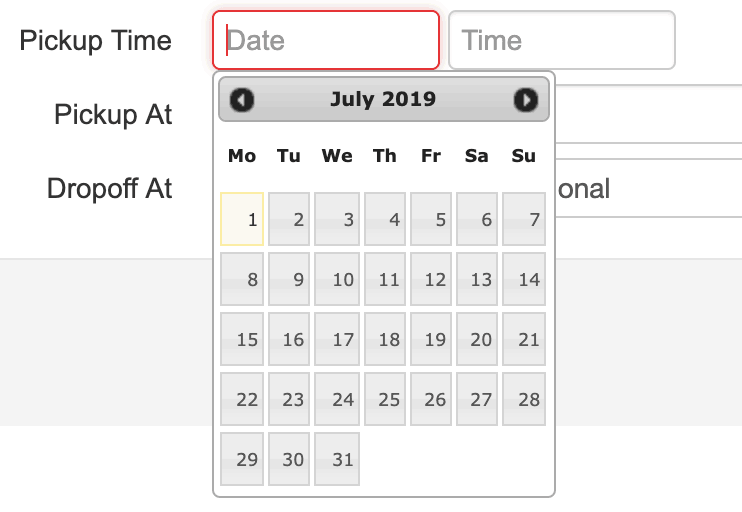My wife recently had some work meetings in Louisville, Kentucky and she had a great idea… “Why don't you fly here on Thursday night instead of flying home?” That was an easy decision and we had an opportunity to do some, ahem, “gemba walks” at a few Kentucky bourbon distilleries on Friday and Saturday.
On Friday afternoon, we arrived at the Four Roses Distillery (about an hour drive from downtown Louisville). It's a beautiful place, with very traditional and historically-protected Spanish Mission-style architecture. And they make great bourbon.

When we walked into the welcome center at about 12:45 pm Friday for our 1 pm tour, I checked in and the woman behind the counter looked in her computer and gave me a facial expression like this:
She said:
“You're actually booked for tomorrow.”
Oh no!
I realized immediately what must have happened. Back to that in second.
I probably gave a look like this:
Before I could say anything, she added, with a smile:
“You're the fourth or fifth person who has done that today… I'm not supposed to since there's just one spot left today, but I'll get you both in.”
Ah, beneficial violations of standardized work! I'll take it. I'll feel a bit bad about it, but I'll take it. Plus, I wasn't in trouble with my wife, who also enjoys these tours immensely.
Related post:
So, what happened? Here is the booking engine for the Four Roses tour. Notice how the calendar goes Monday through Sunday going left to right? For American calendars, that's pretty non-standard.

Most booking engine calendars (like that for American airlines and most hotel chains that I use) run Sunday through Saturday, as shown below:

When four or five people a day (at least) are making that mistake, it screams “system problem.”
I take some responsibility for not being more careful, especially since I've made this mistake before with the airport car service I use in Dallas:

I try to “be more careful” but we're all human… we're prone to human error. I've given feedback to the car service and they realize the calendar can confuse people… but they haven't changed or updated it.
Why?
When a hospital or surgical center constantly has people showing up at the wrong address or the wrong time… do they say, “That happens all the time” or do they fix the process?
Going back ten years ago, a hospital I worked with had a street address of “Motor Street” in Dallas. The street had actually been changed to “Medical District Drive” and that's what the freeway sign said. But, the GPS units of that era weren't always updated as frequently as our smartphone apps are today.
The communication to patients said “Medical District Drive” but when they punched that into their GPS, it said “Address not found.” So, many patients were late to the outpatient center.
When we talked to patients to learn about their experience, they mentioned the address confusion. It had been easy for the hospital staff to blame patients for being late. But, we then changed the communications to say the address was “Medical District Drive, formerly known as Motor Street.”
Sure though, that helped reduce patient lateness. It was a system problem. Fixing the system improves performance more effectively than blaming individuals. Go figure!
We did enjoy our Four Roses tour very much. Here are some photos (click for larger views):
Related post:
Please scroll down (or click) to post a comment. Connect with me on LinkedIn.
Let’s work together to build a culture of continuous improvement and psychological safety. If you're a leader looking to create lasting change—not just projects—I help organizations:
- Engage people at all levels in sustainable improvement
- Shift from fear of mistakes to learning from them
- Apply Lean thinking in practical, people-centered ways
Interested in coaching or a keynote talk? Let’s start a conversation.















Great post. I never thought about how calendars aren’t always standardized by what day the week starts on, and completely see how this lack of standardization could have caused this problem.
I found another failure mode when I tried to use my Google calendar for personal meetings where I wanted to send invitations via my Gmail email address. My primary calendar is my work Outlook one. To mitigate this, I simply added my work email address to the list of invitees so it would show up on my work calendar and I would not have to bounce back and forth between.
As a side note – I used to live in Lexington and have been to several distilleries. I definitely recommend the Woodford Reserve and Town Branch distilleries if you have not visited them already.
Thanks for commenting, Jess!
I had a chance to visit Woodford in 2018… after two Louisville-based visits, our next visit will probably be Lexington based, so we can explore distilleries that are on that side of the state (and my wife and I want to tour the Toyota Georgetown plant).
Mark, building upon your example of calendar layout, a similar incompatibility exists between American and European date format. To Americans, 07/04/2019 represents July 4, 2019. To Europeans, 07/04/2019 is April 7, 2019. the company I work for is based in Europe but has a large presence in North America. My working team represents a mix of North America-based and Europe-based people. To mitigate the date format misunderstandings (after creating several large messes), I now express dates like “April 7, 2019” or 4-July-2019.
Dean – That’s a great example of how a lack of standardization can cause problems in our global communication.
I read something about an NBA summer league player’s birthdate being listed as “9/1/2000” and the announcers were saying he was 18 years old. But, the player is from Europe, so his birthdate is, of course, January 9, 2000, making him 19 years old at the moment…
Yes, it could be painful if people already have adapted to wrong calendar and now they need to adapt to standardised calendar where week starts on Monday.
p.s. ISO 8601
The discussion on LinkedIn: